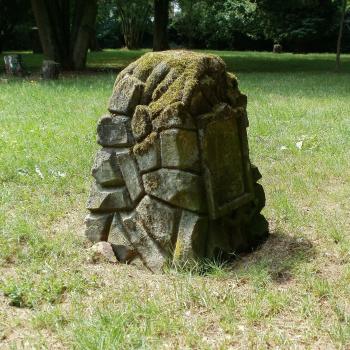I didn’t grow up in a ‘prayerful’ environment. Saying grace was met with low-level hostility, as was the idea of kneeling to a god. Many Pagans have this same mentality concerning kneeling, preferring to stand if they pray at all. (And here it necessary to note that I do not frown upon those that don’t pray but am simply acknowledging how most Pagans, in my experience, approach the issue.)
Me – I kneel. I bow my head and lift my hands. I like doing so. It suits me. I’m equally fond of a stage and a microphone, but that is neither practical nor do I fancy myself enough of a poet or speaker to need them.
Kneeling is hardly necessary when praying, though. I spend an equal amount of time praying while I walk as I do on my knees. While our gestures, posture, and other body language is important to prayer, it is also very specific to each culture, religion, and tradition and I want to instead focus on the verbal component in this part of the series.
Praying aloud is an important part of polytheistic practice, or at least one that places the gods outside of ourselves. Since our gods are not omniscient or omnipotent we can’t expect them to read our minds when we wish to talk to them. We, ourselves, need to reach out with our voices. This is excellently described in P. Sufenas Virius Lupus’ Devotio Antinoo, Volume One:
“Antinous is a god, but that does not mean he is omniscient, omnipresent, or omnipotent. You can pray to him for whatever you like, but it may not be in his power to help you achieve whatever it is you ask for. Antinous can be anywhere, but he’s not everywhere at all times, and thus one must call to him and get his attention. Antinous can know a great deal, but he cannot (and does not!) know everything, and therefore you can’t assume he knows what you want or need, or knows what you’re thinking, or that he even knows you at all until you are introduced to him. This means that in order to pray to him, you actually do need to speak out loud. It can be in a hushed voice, or even a whisper, but it does need to be out loud.”
We can contrast this to Francesca de Grandis speaking of Goddess in Goddesses Initiation, in which Goddess is said to be able to perform any miracle or grant any wish, even those that are not voiced, because she is all-powerful. This highlights most, perhaps, the differences in polytheist and monotheist or monist approaches to prayer and what prayer does.
Praying out loud and addressing specific gods it vital to the polytheist, though. If we use the common metaphor of prayer-as-conversation with the gods, we can say that it is important to be clear in who we are addressing. Using epithets, titles, names, and images or symbols to draw attention from the gods helps us as well, focusing our mind on the deit(ies) we are approaching. While there may be times when we address the ‘whole room’ with prayers to all the gods, specific prayers to individual deities or groups of deities seem to be more common. Just as you would not expect someone who you have not been speaking with to realize you are conversing with them without getting their attention, we cannot expect the gods to know we are praying to them without saying so.
And no matter how fond of a god or gods we may be, we must tell these gods of our fondness and conduct ourselves in such a way as to reflect well on them. Rather than expecting a god to simply ‘know’ that we care for them and wish for them to be in our lives (just as we would not expect our friends to simply ‘know’ if we never conveyed such) we must keep our gods informed – and prayer or praise helps us do this. This is even more important when we consider petitioning a god for favors. Again, this attitude may put polytheists at odds with other Pagans who use the gods ‘as needed’.
How much ‘pomp’ is necessary is debatable and largely dependent on the culture the gods come from as well as the gods themselves. Special garments or jewelry may be worn or specific incense burned or offerings made. For my worship of Antinous I always have an image or symbol of him visible. For my worship of the Four Gods, however, I have prayed while walking to work, sometimes utilizing prayer beads or my fingers to keep count of the prayers. The beads I use for the Four Gods are also exclusive to them. My prayers also change based on who I am trying to communicate with as well as what side of their personality I am wishing to interact with. (Appealing to the Star-Wind as the ‘Boy Beloved of Stars’ stirs a different reaction than calling to the ‘Forgetful Child’, though they are both parts of Him.)
From what I have read and practiced, there are three basic elements to polytheistic prayer: outward prayer*, clear identification of the deit(ies), and mindfulness. (Which here means that one is aware of the meaning of the prayer or epithets being used.0 From there, cultural, religious, or god-specific details to prayer are incorporated.
*Outward prayer is used here to convey that verbalization is not necessarily mandatory, as that would exclude people who are non-verbal. In Devotio Antinoo, PSVL notes that sign language and gestures are just as ‘valid’ as the spoken word. Though I did not go into gestures and body language in this article, I do not wish to exclude those who do not communicate verbally.












